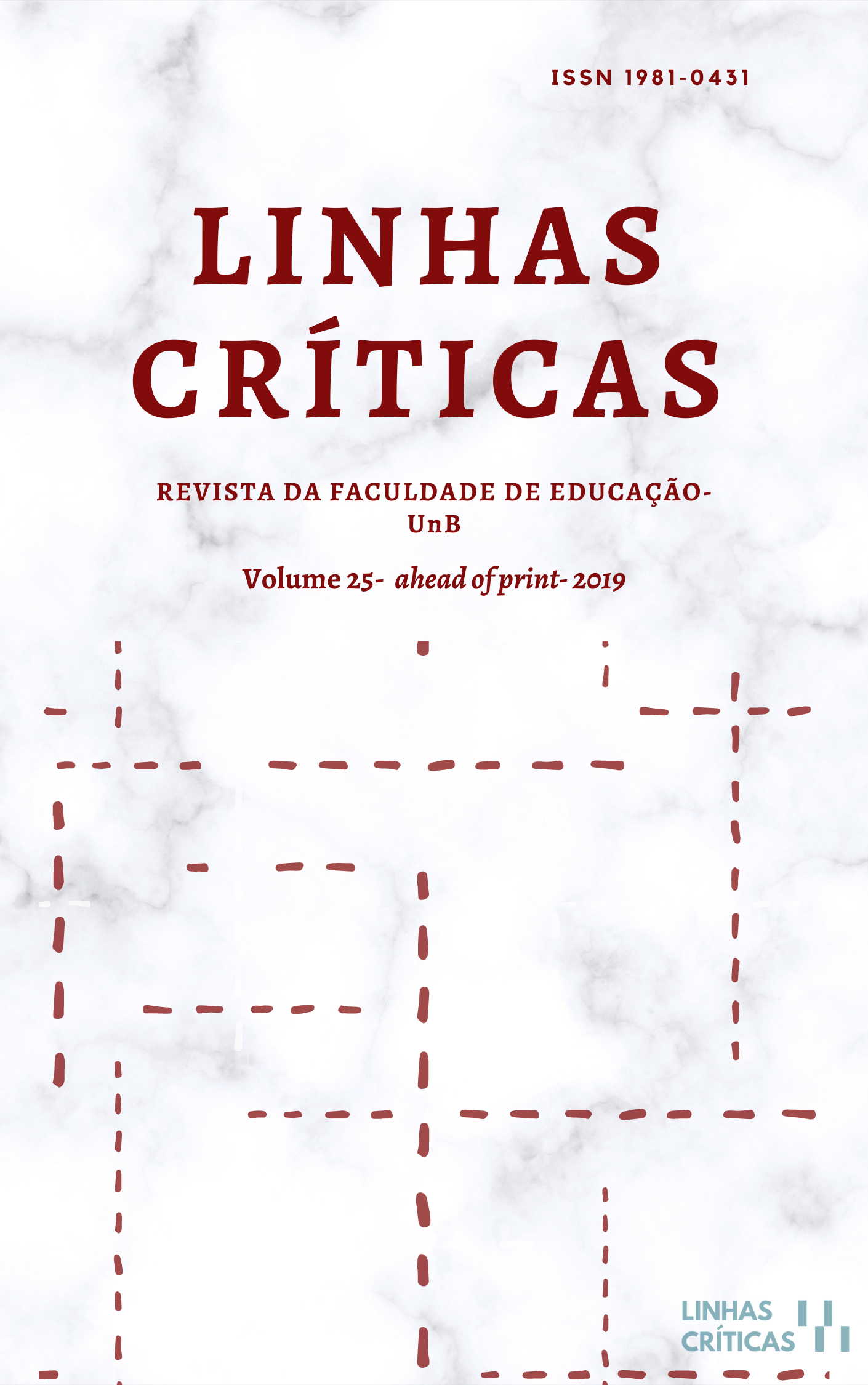Assessment for learning in English and Mathematics in secondary education
DOI:
https://doi.org/10.26512/lc.v25.2019.23798Keywords:
Assessment practices, Assessment to learn, Positive approach to error, Feedback, Secondary EducationAbstract
The present study looks to understand how two teachers, Leonor in English and Ilda in Mathematics, implement assessment practices to support students’ learning. Following a methodology of interpretative nature, we have chosen the case study design. The collection of data occurred through the observation of classes, interviews with the teachers and focus group with students, supported by audio recording. The data analysis was followed by an analysis of content. Although the two subjects are very different, both teachers support their students through formative assessment practices supported by a positive approach to error. This approach provides a rich source for informed feedback.
Downloads
References
Aires, L. (2011). Paradigma qualitativo e práticas de investigação educacional. Universidade Aberta. Consultado em: fevereiro de 2012. https://repositorioaberto.uab.pt/bitstream/10400.2/2028/1/Paradigma%20Qualitativo%20e%20Pr%C3%A1ticas%20de%20Investiga%C3%A7%C3%A3o%20Educacional.pdf
Assessment Reform Group (2002). Testing, motivation, and learning. Cambridge, UK: University of Cambridge, Faculty of Education.
Black, P., & Wiliam, D. (1998). Inside the black box: raising standards through classroom assessment. Phi Delta Kappan, 80, 139–148.
Brulles, D., & Brown, K. (2018). A teacher’s guide to flexible grouping and collaborative learning. Minneapolis: Free Spirit Publishing.
Chappuis, S., & Stiggins, R. (2002). Classroom assessment for learning. Educational Leadership, 60(1), 40-43.
Dias, S., & Santos, L. (2010). O feedback e os diferentes tipos de tarefas matemáticas. XXI SIEM (CD ROM) (pp. 126-136). Aveiro: Associação de Professores de Matemática.
Earl, L. (2013). Assessment as learning: using classroom assessment to maximize student learning (2nd ed.). Thousand Oaks: Corwin Press.
Fernandes, D. (2011). Avaliar para melhorar as aprendizagens: análise e discussão de algumas questões essenciais. http://repositorio.ul.pt/bitstream/10451/5664/1/Avaliar%20para%20melhorar...%20D.%20Fernandes.pdf
Gibbs, G. (2012). El análisis de datos cualitativos en investigación cualitativa. Madrid: Ediciones Morata.
Gipps, C., & Stobart, G. (2003). Alternative assessment. In T. Kellaghan & D. Stuffle beam (eds.), International Handbook of Educational Evaluation (pp. 549-575). Dondrecht: Kluwer.
Hattie, J. (2012). Visible learning for teachers: maximizing impact on learning. New York: Routledge.
Hattie, J., Masters, D., & Birch, K. (2016). Visible learning into action. New York: Routledge.
Hattie, J., & Timperley, H. (2007). The power of feedback. Review of Educational Research, 77(1), 81-112.
Heritage, M. (2010). Assessment for teaching and learning. http://www.k12center.org/publications.html
Lorenzet, S., Salas, E., & Tannenbaum, S. (2005). Benefiting from mistakes: the impact of guided errors on learning, performance, and self-efficacy. Human Resource Development Quarterly, 16(3), 301-322.
Luckesi, C. (2011). Avaliação da aprendizagem: componente do ato pedagógico. São Paulo: Cortez.
Marzano, R., & Pickering, D. (2011). The highly engaged classroom. Bloomington: Marzano Research Laboratories.
OCDE (2014). Teachers as learning specialists: implications for teachers' pedagogical knowledge and professionalism. http://www.eunec.eu/sites/www.eunec.eu/files/event/attachments/summary_of_the_symposium.pdf
Pinto, N. B. (2000). O erro como estratégia didática: estudo do erro no ensino da matemática elementar. Campinas, S. Paulo: Papirus.
Popham, W. (2011). Formative assessment - a process, not a test. Langhorne: Education Week. http://www.edweek.org/ew/articles/2011/02/23/21popham.h30.html
Sadler, D. R. (1989). Formative assessment and the design of instructional systems. Instructional Science, 18, 119–144.
Sadler, P., Sonnert, G., Coyle, H., Cook-Smith, N., & Miller, J. (2013). The influence of teachers’ knowledge on student learning in middle school physical science class rooms. American Educational Research Journal, 50, 1020-1049.
Santos, L. (2002). Auto-avaliação regulada: porquê, o quê e como? In P. Abrantes & F. Araújo (Orgs.), Avaliação das Aprendizagens. Das concepções às práticas (pp. 7584). Lisboa: Ministério da Educação.
Santos, L. (2008). Dilemas e desafios da avaliação reguladora. In L. Menezes, L. Santos, H. Gomes, & C. Rodrigues (eds.), Avaliação em Matemática: Problemas e desafios (pp. 11-35). Viseu: Secção de Educação Matemática da Sociedade Portuguesa de Ciências de Educação.
Santos, L. (2009). Diferenciação pedagógica: um desafio a enfrentar. Noésis, 79, 52-57. http://area.fc.ul.pt/pt/artigos%20publicados%20nacionais/Diferenciacao%20Pedagogica%20Noesis.pdf
Santos, L. (2016). A articulação entre a avaliação somativa e a formativa, na prática pedagógica: Uma impossibilidade ou um desafio? Revista Ensaio: Avaliação e Políticas Públicas em Educação, 24(92), 637-669. http://www.scielo.br/pdf/ensaio/v24n92/1809-4465-en saio-24-92-0637.pdf
Stake, R. E. (2005). Qualitative case studies. In N. Denzin, & Y. Lincoln (Eds.), Handbook of qualitative research (pp.443-466). Thousand Oaks: Sage Publications.
Stiggins, R. (2017). The perfect assessment system. Alexandria, VA: ASCD.
Stobart, G., & Gipps, C. (1997). Assessment: A teacher's guide to the issues. London: Hodder & Stoughton.
Taras, M. (2005). Assessment, summative and formative - some theoretical reflections. British Journal of Educational Studies, 53(4), 466-478.
Vieira, I. A. (2019). Avaliar para aprender nas disciplinas de inglês e matemática no ensino secundário (Tese de Doutoramento, Universidade de Lisboa). http://repositorio.ul.pt/handle/10451/37477
Wiliam, D. (2011). Embedded formative assessment- practical strategies and tools for K-12 teachers. Bloomington: Solution Tree Press.
Wiliam, D. (2016). Leadership for teacher learning: creating a culture where all teachers improve so that all students succeed. Palm Springs: Learning Sciences International.
Published
How to Cite
Issue
Section
License
Copyright (c) 2019 Linhas Críticas

This work is licensed under a Creative Commons Attribution 4.0 International License.
Authors who publish in this journal agree to the following terms:
-Authors maintains the copyright and grants the journal the right of first publication, the work being simultaneously licensed under the Creative Commons Attribution License which allows the sharing of the work with recognition of the authorship of the work and initial publication in this journal.
- Authors are authorized to enter into additional contracts separately, for non-exclusive distribution of the version of the work published in this journal (eg publish in institutional repository or as a book chapter), with acknowledgment of authorship and initial publication in this journal.
-Authorers are allowed and encouraged to publish and distribute their work online (eg in institutional repositories or on their personal page) at any point before or during the editorial process, as this can generate productive changes as well as increase the impact and the citation of published work (See The Effect of Free Access).



